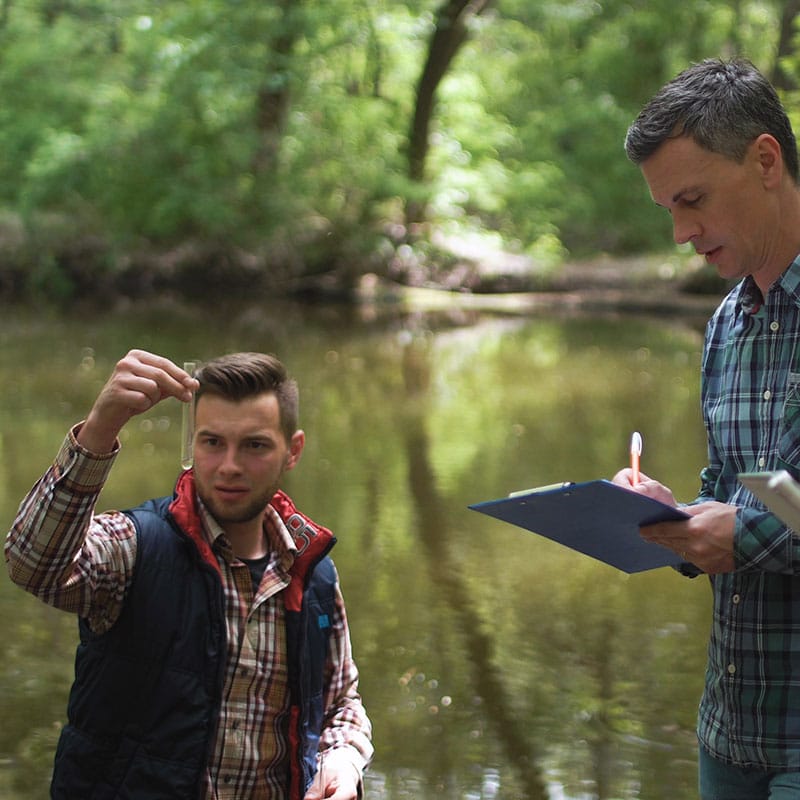Alumni
News
Public Health



8-week terms allow for start dates throughout the year
Earn your MPH degree in as little as 16 months at the Accelerated program pace
Complete 42 credits to earn your MPH degree
Comprehensive public health curriculum to help you prepare for today’s evolving healthcare landscape
Innovative learning tools, including virtual simulations for community and population health
Flexible online coursework with multiple program paces to choose from
One-on-one faculty mentoring and the ability to message instructors directly via the Remind app

In as little as 16 months, WCU’s online Master of Public Health program delivers a well-rounded education on the science and practice of health promotion and disease prevention, with a focus on community-based solutions.
Learn about topics such as health promotion, environmental health, epidemiologic research methods, cultural competence, health leadership, and health policy. As part of your final class, you will integrate concepts learned in prior terms to create an innovative project designed to make a difference in your community.
Explore environmental and social determinants of health while learning how to design population-level strategies that support lasting wellness and prevention.
In your final course, you’ll develop a community-based public health initiative that puts your knowledge into practice and showcases your leadership.
Complete your public health degree in as little as 16 months at the Accelerated Pace with 100% online coursework, or choose the Working Professional Pace and earn your degree in as little as 28 months.
Distance Education/Online
42 Credits
16 Months
4 Trimesters
Distance Education/Online
42 Credits
28 Months
7 Trimesters
To achieve the graduation requirement of 42 credits, all students must complete 42 credits of core courses. Core courses provide students with the specific discipline experience required for the degree.
Core Courses:
Core Courses to be completed by all students (42 credits)
| HA 500 | Legal and Ethical Issues in Health Care Management | 3 |
| HA 530 | Managerial Epidemiology | 3 |
| HA 535 | Health Research Methods | 3 |
| PH 500 | Foundations of Public Health | 3 |
| PH 511 | Health Promotion and Social & Behavioral Health Sciences | 3 |
| PH 515 | Cultural Diversity & Health Disparities in Public Health | 3 |
| PH 521 | Biostatistics | 3 |
| PH 525 | Development and Evaluation of Health Education Programs | 3 |
| PH 536 | Environmental and Occupational Health | 3 |
| PH 540 | Special Topics in Epidemiology | 3 |
| PH 546 | Leadership Principles and Policies in Public Health | 3 |
| PH 551 | Global Family Health | 3 |
| PH 560 | Infectious Diseases – Applied Practical Experience | 3 |
| PH 566 | Integrated Learning Experience | 3 |
| Total Credit Hours: | 42 | |
We know school is a substantial commitment. At WCU, we want to equip you with all the information you need to make the right decision for your future.
Our goal is to give you a clear understanding of MPH tuition costs so you can be well-informed as you navigate the application and enrollment process. To assist you in your decision, we provide a breakdown below of the MPH online program costs at West Coast University.
We offer several financial aid options — including scholarships, grants, and loan access — to help support you through your studies. For more information about your financial support options, visit our financial aid page.
Estimated Cost of Attendance is comprised of both direct costs and indirect costs, as outlined in the charts below. The purpose of the Cost of Attendance (COA) is to provide students and families with an estimated cost to attend West Coast University. The COA includes both direct and indirect cost estimates and are categorized as follows: (1) Direct costs are paid directly to West Coast University and are shown separately for each program; (2) Indirect costs are not paid to West Coast University and are estimates students may use to budget expenses they may incur while attending school. While actual indirect costs may vary, West Coast University estimates these amounts based on the number of months in an academic year and whether students will live with parents or off campus.
Direct Costs
| Degree Type | Enrolling prior to Summer 2 2025 | Enrolling after Summer 2 2025 |
| Total Program Credits | 42 | 42 |
| Program Length (Full-Time) | 4 trimesters | 4 trimesters |
| Total Tuition Cost (per credit) | $575 | $590 |
| Total Tuition Cost | $24,150 | $24,780 |
| STRF1 | $0 | $0 |
| Technology Fee2 | $2,000 | $2,000 |
| Estimate for Program Supply Fees3 | $50 | $50 |
| Estimated Total Program Costs (Texas) | $26,200 | $26,830 |
| Estimated Total Program Costs (California) | $26,200 | $26,830 |
Indirect Costs
| 8 Month Academic Year4 | ||||
| Prior to Fall I 2024 | Starting Fall I 2025 | |||
| with parents | off campus | with parents | off campus | |
| Federal Student Loan Fees | $220 | $220 | $220 | $220 |
| Living Expenses (Food & Housing) | $2,496 | $8,328 | $2,616 | $8,728 |
| Transportation | $1,728 | $1,728 | $1,776 | $1,776 |
| Personal Expenses | $5,656 | $5,656 | $5,656 | $5,656 |
| Total | $10,100 | $15,932 | $10,268 | $16,380 |
* Upon enrollment, students select Accelerated or Working Professional, which will determine the pace at which students complete their degree. In most cases, students that select Accelerated will attempt two courses per term, and students that select Working Professional will attempt one course a term.
1 Effective April 1, 2024, the Student Tuition Recovery Fund (STRF) assessment rate will be zero dollars and zero cents ($0.00) per one thousand dollars ($1,000) of institutional charges.
The State of California established the Student Tuition Recovery Fund (STRF) to relieve or mitigate economic loss suffered by a student in an educational program at a qualifying institution, who is or was a California resident while enrolled, or was enrolled in a residency program, if the student enrolled in the institution, prepaid tuition, and suffered an economic loss. Unless relieved of the obligation to do so, you must pay the state-imposed assessment for the STRF, or it must be paid on your behalf, if you are a student in an educational program, who is a California resident, or are enrolled in a residency program, and prepay all or part of your tuition.
You are not eligible for protection from the STRF and you are not required to pay the STRF assessment, if you are not a California resident, or are not enrolled in a residency program.
It is important that you keep copies of your enrollment agreement, financial aid documents, receipts, or any other information that documents the amount paid to the school. Questions regarding the STRF may be directed to the Bureau for Private Postsecondary Education, 1747 N. Market Blvd. Ste 225 Sacramento, CA 95834, (916) 431-6959 or (888) 370-7589.
To be eligible for STRF, you must be a California resident or enrolled in a residency program, prepaid tuition, paid or deemed to have paid the STRF assessment, and suffered an economic loss as a result of any of the following:
To qualify for STRF reimbursement, the application must be received within four (4) years from the date of the action or event that made the student eligible for recovery from STRF.
A student whose loan is revived by a loan holder or debt collector after a period of noncollection may, at any time, file a written application for recovery from STRF for the debt that would have otherwise been eligible for recovery. If it has been more than four (4) years since the action or event that made the student eligible, the student must have filed a written application for recovery within the original four (4) year period, unless the period has been extended by another act of law.
However, no claim can be paid to any student without a social security number or a taxpayer identification number.
2Technology Fee includes student technical support, Office 365, blended and online course delivery/learning management system, mobile app, student portal technology and access, and required electronic course materials/software.
3 Program supplies include WCU identification card and background check.
4 The purpose of the Cost of Attendance (COA) is to provide students and families with an estimated cost to attend West Coast University. The COA includes both direct and indirect cost estimates. Direct costs are paid directly to West Coast University and are shown separately for each program. Indirect costs are not paid to West Coast University and are estimates students may use to budget expenses they may incur while attending school. While actual indirect costs may vary, West Coast University estimates these amounts based on the number of months in an academic year and whether students will live with parents or off campus.
Direct Costs
| Degree Type | Enrolling prior to Summer 2 2025 | Enrolling after Summer 2 2025 |
| Total Program Credits | 42 | 42 |
| Program Length (Full-Time) | 7 trimesters | 7 trimesters |
| Total Tuition Cost (per credit) | $575 | $590 |
| Total Tuition Cost | $24,150 | $24,780 |
| STRF1 | $0 | $0 |
| Technology Fee2 | $3,500 | $3,500 |
| Estimate for Program Supply Fees3 | $50 | $50 |
| Estimated Total Program Costs (Texas) | $27,700 | $28,830 |
| Estimated Total Program Costs (California) | $27,700 | $28,330 |
Indirect Costs
| 8 Month Academic Year4 | ||||
| Prior to Fall I 2024 | Starting Fall I 2025 | |||
| with parents | off campus | with parents | off campus | |
| Federal Student Loan Fees | $220 | $220 | $220 | $220 |
| Living Expenses (Food & Housing) | $2,496 | $8,328 | $2,616 | $8,728 |
| Transportation | $1,728 | $1,728 | $1,776 | $1,776 |
| Personal Expenses | $5,656 | $5,656 | $5,656 | $5,656 |
| Total | $10,100 | $15,932 | $10,268 | $16,380 |
* Upon enrollment, students select Accelerated or Working Professional, which will determine the pace at which students complete their degree. In most cases, students that select Accelerated will attempt two courses per term, and students that select Working Professional will attempt one course a term.
1 Effective April 1, 2024, the Student Tuition Recovery Fund (STRF) assessment rate will be zero dollars and zero cents ($0.00) per one thousand dollars ($1,000) of institutional charges.
The State of California established the Student Tuition Recovery Fund (STRF) to relieve or mitigate economic loss suffered by a student in an educational program at a qualifying institution, who is or was a California resident while enrolled, or was enrolled in a residency program, if the student enrolled in the institution, prepaid tuition, and suffered an economic loss. Unless relieved of the obligation to do so, you must pay the state-imposed assessment for the STRF, or it must be paid on your behalf, if you are a student in an educational program, who is a California resident, or are enrolled in a residency program, and prepay all or part of your tuition.
You are not eligible for protection from the STRF and you are not required to pay the STRF assessment, if you are not a California resident, or are not enrolled in a residency program.
It is important that you keep copies of your enrollment agreement, financial aid documents, receipts, or any other information that documents the amount paid to the school. Questions regarding the STRF may be directed to the Bureau for Private Postsecondary Education, 1747 N. Market Blvd. Ste 225 Sacramento, CA 95834, (916) 431-6959 or (888) 370-7589.
To be eligible for STRF, you must be a California resident or enrolled in a residency program, prepaid tuition, paid or deemed to have paid the STRF assessment, and suffered an economic loss as a result of any of the following:
To qualify for STRF reimbursement, the application must be received within four (4) years from the date of the action or event that made the student eligible for recovery from STRF.
A student whose loan is revived by a loan holder or debt collector after a period of noncollection may, at any time, file a written application for recovery from STRF for the debt that would have otherwise been eligible for recovery. If it has been more than four (4) years since the action or event that made the student eligible, the student must have filed a written application for recovery within the original four (4) year period, unless the period has been extended by another act of law.
However, no claim can be paid to any student without a social security number or a taxpayer identification number.
2Technology Fee includes student technical support, Office 365, blended and online course delivery/learning management system, mobile app, student portal technology and access, and required electronic course materials/software.
3 Program supplies include WCU identification card and background check.
4 The purpose of the Cost of Attendance (COA) is to provide students and families with an estimated cost to attend West Coast University. The COA includes both direct and indirect cost estimates. Direct costs are paid directly to West Coast University and are shown separately for each program. Indirect costs are not paid to West Coast University and are estimates students may use to budget expenses they may incur while attending school. While actual indirect costs may vary, West Coast University estimates these amounts based on the number of months in an academic year and whether students will live with parents or off campus.
Applicants for the Master of Public Health program must:
Master of Public Health Transfer Credit Evaluation: Only graduate level courses in which a grade of B (3.0) or better was received, taken in a program similar to the Master of Public Health will be evaluated for transfer credit. A maximum of nine (9) credit hours will be considered for transfer and must reflect the same content and course credit as the course for which transfer credit is requested.
For more information on our program requirements, please visit our catalog.
New academic terms usually start every eight weeks. Review our Academic Calendar for term start and completion dates.

Our Career Services team is committed to helping WCU students and graduates succeed in their search for the right job.1 Whether you’re an existing MPH student or an alumnus navigating the job market, you can take advantage of the following resources:
Our Career Services department is here to support you from day one through graduation and beyond!
Public health administrators can work in a variety of roles and settings, depending on their interests and specialties. For example, according to the Bureau of Labor Statistics and the Centers for Disease Control and Prevention, health education specialists, community health workers, public health workers, and health services managers can work in:
Upon graduation, MPH graduates will possess the knowledge, skills and aptitude to:

Dr. Michele Mouttapa is the Dean of Public Health at West Coast University. She arrived at WCU from California State University, Fullerton (CSUF) in 2022 after 16 years of service as a Professor of Public Health. Dean Mouttapa has taught statistics and research methods for both undergraduate and graduate students. She has also been the faculty chair for dozens of MPH culminating research projects and theses, many of which have resulted in peer-reviewed publications.
As MPH Coordinator at CSUF, Dean Mouttapa led the Council on Education for Public Health self-study and site visit in 2013, which resulted in a seven-year accreditation. She is utilizing this experience to seek accreditation for the WCU MPH program. Her own research examines psychosocial factors in underserved communities that contribute to a variety of outcomes including substance use, cancer, and obesity.
From 2008 to 2015, Dean Mouttapa was Editor of the Californian Journal of Health Promotion, which is an indexed, open-access peer-reviewed journal. She also has years of experience helping students interested in any health profession to gain acceptance into post-graduate health professional schools, including medical school. Dean Mouttapa earned her B.S. in psychology from University of California, Davis; her M.A. in Psychology from California State University, Fullerton; and her Ph.D. in preventive medicine, health behavior research from the University of Southern California.
In her time outside of academics, Dean Mouttapa is an avid tennis player who captains league tennis teams and competes at the local and national levels. Her husband is a tennis coach, and her two children are tennis enthusiasts as well. She also enjoys gardening and sharing her citrus fruits with others.

Dr. Alexandra Auslander is an Associate Professor for West Coast University’s Master of Public Health (MPH) program. Prior to joining WCU, Dr. Auslander was a lecturer for the Department of Kinesiology and Health Promotion at California State Polytechnic University, Pomona, as well as an adjunct professor for the Department of Physical Education at Fullerton College and Cypress College.
In addition to teaching public health courses at WCU, Dr. Auslander is working for a research team in community public health as a physical activity subject matter expert. Her team’s focus is on reducing the risk of chronic disease in underserved and vulnerable populations in Southern California. The project, which focuses on adverse childhood experiences (ACEs) and toxic stress, is being funded by a grant from the Surgeon General of California.
Dr. Auslander earned her PhD in health promotion with a concentration in public health from Claremont Graduate University, which is where she also earned her Master of Public Health (MPH) in with a focus on biostatistics and epidemiology. She additionally has a master’s degree in kinesiology from California Polytechnic University, Pomona and a bachelor’s degree in biology from San Francisco State University.
From 2015 to 2019, Dr. Auslander completed a Community and Global Health Fellowship at Claremont Graduate University. Her academic and professional honors include the 2015-2016 Cal Poly Pomona Intercollegiate Athletics Recognition of Appreciation, the 2016 Travel Award from Claremont Graduate University, and acceptance into the 2016 Chancellor’s Doctoral Incentive Program from the California University Chancellor’s Office. Dr. Auslander has also been awarded grants, fellowships, contracts, and research opportunities from the 2016 Delta Omega Honorary Society in Public Health.
With a passion for public health research, Dr. Auslander has had her work published in various health journals, and she has presented her research papers at the conventions of regional and national industry associations.
Dr. Auslander is married with two young children and a lab dog. She loves to cook, exercise, travel, and eat great food. One of her favorite sayings is “Cook with Love and Eat with Passion.”
In our online MPH program, you have the flexibility to set your study hours around your work hours. Because you don’t have any set class times, you have 24/7 access to your coursework and can complete assignments at any time of the day or night. We do set weekly deadlines, but you have the freedom to decide how and when you will complete you work within each week.
The length of your program depends on which pace you choose. You can complete your degree in as little as 16 months at the Accelerated pace, or 28 months at the Working Professional pace. Additionally, if you completed the bridge program for your Bachelor of Science in Public Health degree at West Coast University, you should be able to complete your MPH program in a shorter span of time.
WCU considers credit transfers for the MPH program. You can work directly with your advisor to see which credits may be applied to your new degree and to get more information on the transfer credit process.
We’ll review your industry certifications and/or previous work experience to assess whether they can be used for transfer credits toward your MPH degree. If so, you may have a shorter time to completion for your program.
The mission of WCU’s MPH program is to prepare future public health professionals who know how to collaborate, create, apply, and share scholarly knowledge to improve the well-being and health of diverse individuals and communities.
When you become a WCU student, we’re here for you every step of the way. From day one, you get an assigned Student Success advisor who will guide you throughout your educational journey, as well as access to our no-cost tutoring and writing center. You’ll be able to contact your instructors directly with any questions and even choose a faculty mentor to provide industry insight and guidance You also have around-the-clock access to your coursework, the WCU online library, and technical support. No student is ever alone at WCU!
Financial aid and scholarships are available for those who qualify. There are many different types of aid you may be able apply for (depending on your circumstances), including student loans, grants, scholarships, employer tuition reimbursement, military educational benefits, and more. Visit the online division scholarships and grants page on our catalog, or go to our financial aid page to explore more options.

West Coast University is accredited by WASC Senior College of University Commission (WSCUC), an institutional accrediting body recognized by the U.S. Department of Education (USDOE) and the Council on Higher Education Accreditation (CHEA). 1080 Marina Village Parkway, Suite 500 Alameda, CA 94501, (510) 748- 9001/ https://www.wscuc.org/
West Coast University is an applicant for accreditation by the Council on Education for Public Health. The accreditation review will address the Master of Public Health (MPH) program. Other degrees and areas of study offered by this institution will not be included in the unit of accreditation review. For more information, please visit ceph.org.
The West Coast University Master of Public Health program is undergoing a review by the Council on Education for Public Health (CEPH) for accreditation. Part of this process includes the provision of a third-party comment period, which allows anyone, including students, alumni, faculty, staff, community and practice partners, and members of the public, to share relevant information about the MPH Program directly with CEPH.
If you have any information about the West Coast University MPH Program you would like to share with CEPH to inform their review, send your comments to submissions@ceph.org by December 12th 2025.
1 WCU provides career guidance and assistance but cannot guarantee employment.
2 Bureau of Labor Statistics, U.S. Department of Labor, Occupational Outlook Handbook, Health Education Specialists and Community Health Workers
3 Bureau of Labor Statistics, U.S. Department of Labor, Occupational Outlook Handbook, Medical and Health Services Managers
4 Centers for Disease Control and Prevention, Science, Technology, Engineering, and Math (STEM) at CDC
WCU Distance education programs are delivered out of the California and Texas campuses and may not be available to residents in all states.
Practice Experience is required in order to graduate from the RN to BSN, RN to MSN, MSN, DNP degree and Post-Master’s certificate programs.
Financial aid and scholarships are available for those who qualify.